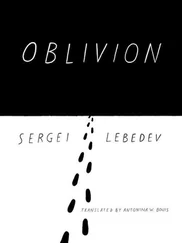I’ve died, thought Jeremias. I’ve died, and that gecko is God.
Even supposing that the gecko was indeed God, He would appear to be hesitating about what fate to assign him. To Jeremias, this indecision was even stranger than finding himself face to face with the Creator, and the fact that He had taken on the form of a reptile. Jeremias knew, and had known for quite some time, that he was destined to burn for all eternity in the flames of Hell. He had killed, he had tortured. And if he’d started off doing those things out of duty, obeying orders, he had later acquired a taste for it. He only felt awake, whole, when he was racing through the night in pursuit of other men.
‘Make your mind up,’ said Jeremias to the gecko. Or rather, tried to say, but all that came out of his mouth was a dull tangled thread of sounds. He made a second attempt and, as in a nightmare, the dark rush of noise came again.
‘Don’t try and talk. Actually, you’re not going to talk ever again.’
Jeremias believed, for some moments, that it was God who was condemning him to eternal silence. Then he turned his eyes to the right and saw a hugely fat woman leaning against the door. Her hands, with their tiny, fragile fingers, danced before her as she spoke:
‘Yesterday they announced your death in the newspapers. They published a photograph — it was quite an old one, I almost didn’t recognise you. They said you were a devil. You died, you were reborn and you have another chance. Make the most of it.’
Madalena had been working at the Maria Pia hospital for five years. Before that she had been a nun. A neighbour had witnessed the shooting of the mercenaries at a distance and had notified her. The nurse drove to the site on her own. One of the men was still alive. A bullet had passed through his chest, on a miraculous, perfect course that hadn’t hit a single vital organ. A second projectile had gone into his mouth, shattering his two upper incisors, then perforating his throat.
‘I don’t understand what happened. Were you trying to catch the bullet in your teeth?’ She laughed, her body shaking. The light seemed to laugh with her. ‘Yes sir, those are some good reflexes. And it wasn’t even such a bad idea, either. If the bullet hadn’t found your teeth, it would have taken a different direction. It would have killed you or left you paralysed. I thought it best not to take you to hospital. They would take care of you and then, when you were recovered, they’d only shoot you again. So be patient, and I’ll look after you myself with what little resources there are. I just have to get you out of Luanda. I don’t know how long I’ll be able to hide you. If the comrades find you, they’ll shoot me too. As soon as possible we’ll travel south.’
She hid him for nearly five months. By listening to the radio, Jeremias was able to follow the difficult progress of the government troops, supported by the Cubans, against the improvised, unstable alliance between the UNITA party, the National Front, the South African army, and mercenaries from Portugal, England and North America.
Jeremias was dancing on the beach in Cascais with a platinum blonde, and he had never been in a war, never killed, never tortured anyone, when Madalena shook him:
‘Come on, captain! We go today or never.’
The mercenary sat up in bed, with some effort. The rain was crackling in the darkness, muffling the noise of what sparse traffic there was at that time. They were to travel in a little old van, a Citroën 2CV, its yellow bodywork badly worn, partly eaten away by rust, but with its engine in perfect working order. Jeremias stretched out on the back seat, hidden by various crates of books.
‘Books instil respect,’ explained the nurse. ‘If you carry crates full of beer bottles, the soldiers will search every inch of the vehicle. Besides which, you’d get to Moçâmedes without a single bottle left.’
Her strategy proved correct. At the many checkpoints they passed through, the soldiers stood to attention when they saw the books, many apologising to Madalena, and let her go on her way. They arrived in Moçâmedes on an airless morning. Jeremias saw, through a small hole in the rusty side of the vehicle, a little town, dazed and spinning slowly about itself like a drunk at a funeral. Months earlier, the South African troops had come through here on their way to Luanda, easily crushing a troop made up of pioneiros and Mucubals.
Madalena parked the van in front of a solid blue mansion. She got out, leaving Jeremias to bake inside. The mercenary was sweating heavily. He could barely breathe. It would be preferable to get out too, he thought, even if it meant risking arrest, getting himself killed. He couldn’t push the crates aside. He started kicking at the metal. An old man came over:
‘Who’s in there?’
Then he heard Madalena’s gentle voice:
‘I’m taking a little goat over to Virei.’
‘But Virei’s full of goats already! Ha ha! Imagine taking a goat to Virei!’
When the van was moving again, a bit of fresh air began to come in. Jeremias settled down. They drove for more than an hour, bumping about along secret routes through a landscape that seemed, to Jeremias, to be made entirely of hard winds, stone, dust and barbed wire. Finally, they stopped. A commotion of voices surrounded the vehicle. The back door opened and someone pulled out the boxes. There were dozens of curious faces. Women with their bodies painted red. Some of them quite old. Others still adolescent, their breasts pert and nipples swollen. Tall lads who looked very elegant indeed, each with a tuft of hair on the top of his head.
‘My late father was born in the desert. He was buried here. These people are very devoted to him,’ explained Madalena. ‘They’ll take you in and hide you for as long as necessary.’
The mercenary sat down on the floor, straightened his shoulders like a king parading naked, his silhouette the prickly shadow of a mutiati tree. A group of children surrounded him, touched him, pulled his hair. The young men laughed loudly. They were fascinated by the rough silence of this man, his distant gaze, the spectre of a past they sensed was violent and troubled. Madalena said goodbye with a slight nod:
‘Wait here. They’ll come for you. When everything calms down you’ll be able to cross the border to South-West Africa. I imagine you have good friends among the white men.’
Years passed. Decades. Jeremias never crossed the border.
Che Guevara was very agitated this morning.
He was jumping from branch to branch. Crying out.
Later, looking out of the living room window, I saw a man, running.
A tall fellow, really thin, incredibly agile. Three soldiers were running after him, close behind. Throngs of people were streaming from the corners, in bursts, joining the soldiers. Within moments there was a whole crowd in pursuit of the fugitive. I saw him crash into a boy who was crossing in front of him on a bicycle, and he tumbled, flailing, into the dust. The mob was about to reach him, it was just an arm’s length from him, when the man jumped onto the bicycle and resumed his flight. By now a second group had formed, a hundred metres further along the road, and there were stones raining down. The poor wretch ducked into a narrow alleyway. If he could have seen a bird’s-eye view, like I could, he never would have done it. A dead end. When he realised his mistake, he ditched the bike and tried to jump the wall.
A tossed stone hit the back of his neck and he fell.
The throng reached him. They launched themselves, kicking, onto his thin body. One of the soldiers drew a pistol and fired it into the air, clearing a way through. He helped the man to his feet, holding the pistol pointed towards the crowd. The other two were shouting orders, attempting to calm tempers. Finally they managed to make the crowd move back, they dragged the prisoner off to a van, threw him inside and left.
Читать дальше












